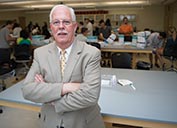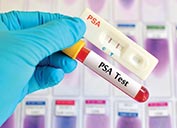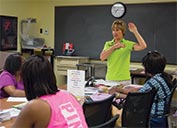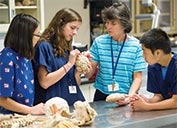Rounds
Researchers discover biomarker for early identification of aggressive prostate cancer
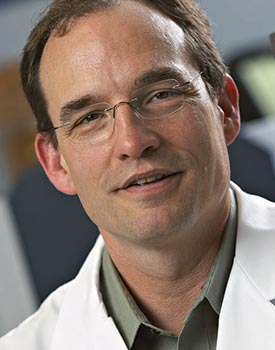
A team of scientists from EVMS and the University of Toronto has made a significant breakthrough in the area of advanced prostate-cancer detection.
They say they have identified the first liquid-biopsy biomarker for aggressive prostate cancer.
The discovery could play a vital role in treatment. “We want to be able to identify advanced disease prior to surgery,” says John Semmes, PhD, Director of the Leroy T. Canoles Jr. Cancer Research Center and Professor of Microbiology and Molecular Cell Biology. “If it has grown beyond the prostate, more aggressive treatment options are warranted.”
Their research was published in the journal Nature Communications.
Signs and Symptoms of Prostate Cancer
- Persistent hip, upper thigh or lower back pain
- Difficulty having an erection
- Difficulty urinating and weak urine flow
- Painful or burning urination
- Blood in your urine or semen
Psychologists craft new way to evaluate adolescents

When adolescents exhibit behavioral problems, it falls to a psychologist to determine what’s wrong and how to help.
The most popular tool used worldwide for evaluating teens ages 14-18 is a test known as the MMPI-A. Now, EVMS psychologists Robert Archer, PhD, and Richard Handel, PhD, have helped develop a new test known as the MMPI-A-RF, which may one day take the place of the older version.
The new test is the result of nine years of work between the EVMS psychologists and two collaborators.
“The MMPI-A was based on a methodology of test construction that existed in the 1940s,” explains Dr. Archer, the Redwood Distinguished Professor of Psychiatry and Behavioral Medicine and Professor of Psychiatry and Behavioral Medicine. “The MMPI-A-RF is based on a modern theory of test construction, which uses some analysis techniques that weren’t available in the 1940s.”
A primary goal for the new test was to provide for more discreet measurement. “The new test is more focused,” says Dr. Handel, Professor of Psychiatry and Behavioral Sciences.
A byproduct of the refined test is the reduced length. The new test has 241 items versus 478 items in the original test. The researchers studied test results from 15,000 teens to help them fashion the new test.
Dr. Archer is releasing a book this fall to help his colleagues grasp the differences between the two tests.
EVMS researcher honored as one of two JSAT fellows
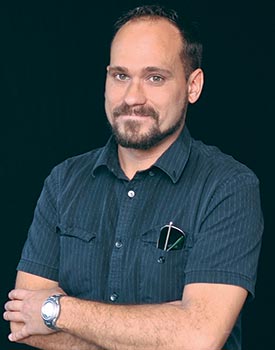
Paul Harrell, PhD, Assistant Professor of Pediatrics, is one of two researchers selected for the Journal of Substance Abuse Treatment (JSAT) Editorial Fellowship Program for 2016-17. JSAT is the leading scientific journal dedicated to addiction treatment services and implementation research.
“Dr. Harrell successfully competed with a large group of applicants from across the United States and internationally,” says Mark McGovern, JSAT’s Editor-in-Chief. “His experience in many aspects of addiction research and his productive publication record were the primary reasons for his selection. Dr. Harrell’s career is on a rapid and upward trajectory, and we are thrilled to have him join this class of two editorial fellows.” The other fellow selected is from Johns Hopkins University School of Medicine.

Exchange program gives MPH students an international perspective
Three EVMS public-health graduates, fresh out of school, are having an international impact.
Janisse Tate, Alicia Feliciano and Asha Patel were part of a student exchange program. In addition to experiencing the Moldovan culture, the students had the rare opportunity to meet with the nation’s highest-ranking health officials and tour a range of clinics across the country of 3.5 million people.
During their project, the students studied health-care systems in several countries. They brought together the best aspects of each to recommend a model surveillance system for Moldova. The experience taught them valuable lessons about health care, regardless of the setting.
“The most important takeaway from our experience in Moldova,” Ms. Patel says, “is definitely understanding that no health-care system is perfect. There are aspects of the Moldovan health-care system I wish the United States would learn to implement and vice versa.”
The trio found many similarities and differences. For instance, public-health professionals in both countries have major concerns about non-communicable diseases. In contrast to the U.S., Moldova depends on specialty clinics, forcing patients with multiple health issues to visit a series of facilities to receive proper care.
Despite shortcomings in the Moldovan system, the country is striving for progress.
“I noticed how dedicated the Moldovan people are when it comes to improving their system,” Ms. Feliciano says. “They recognize where they need to make some changes and are really putting forth the effort to make those changes come to life.”
For Ms. Tate, her experiences also revealed the value of teamwork.
“We all have various experiences that we can share,” she says, “and we can all learn so much from each other.”



